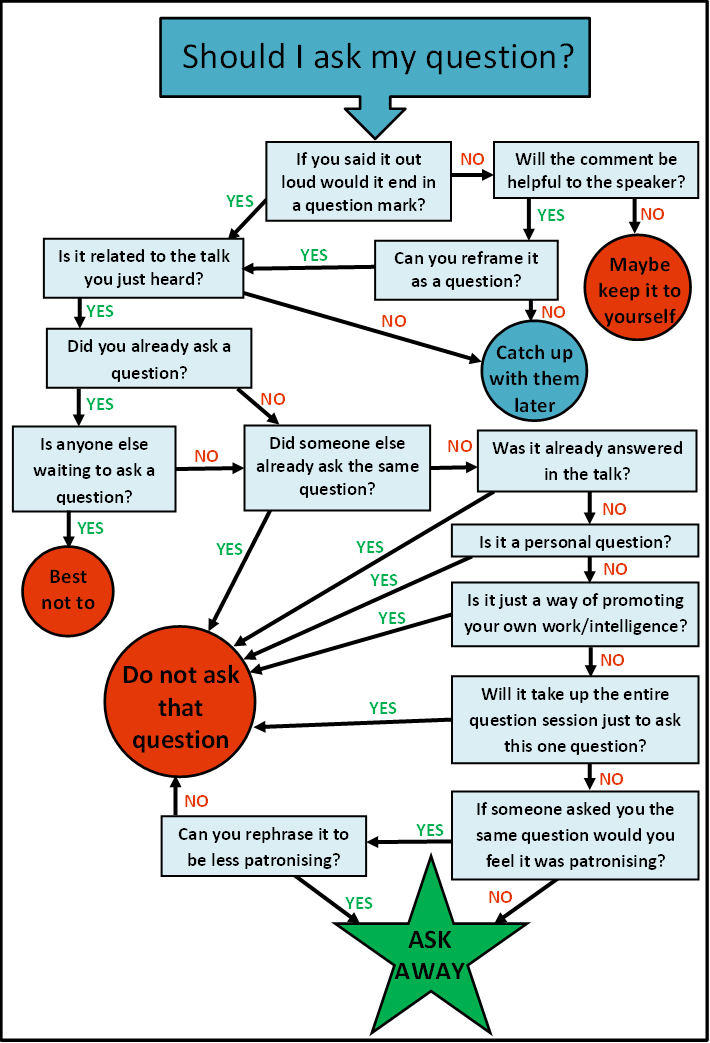An ongoing theme has emerged from the last few conferences I have attended, and a number of conversations I have had with fellow academics on Twitter. A lot of people don’t seem to be getting the most out of their experience at conferences because they do not know how to ask good questions (or they choose not to!), and often, they end up being disrespectful, patronising or sometimes even downright offensive in the process. This can also prevent those on the receiving end from getting the most out of their conference experience, as it can be pretty miserable! This isn’t a huge surprise – I mean, no-one is ever really ‘taught’ about good engagement at conferences. As many academics seemed to have similar experiences, I teamed up with Jeff Clements (@biolumiJEFFence) to share experiences and put together the following guide (you can find the sister version over at his website: https://.marineecologistmusings.wordpress.com).
What’s the issue?
In a largely unscientific Twitter poll of 488 fellow academic tweeters, only 28% had never had a negative experience with conference criticism, whilst 40% had had a negative experience with criticism that was done respectfully (generally part of conference experience but can be tough!). However, nearly 1/3 of people polled had had negative experiences where others had been disrespectful, or had engaged in an ‘all-out war’ with an audience member.
Sadly, for us as authors, this was unsurprising. Dani has been told she was wrong about her own study species because the questioner ‘had seen them hunting’ (anecdote vs data, anyone?), while Jeff has been publically told that his work will do nothing for his career and may even hinder his progression. In addition, we have both witnessed some incredibly aggressive questioning styles at conferences. A wide variety of respondents to the Twitter poll also shared their experiences, many of which were, we think you’d agree, pretty awful:
This brings us onto a second issue – one that nearly all of us have experienced – the ‘this isn’t a question but a comment’ during conference question sessions.

Of 387 people polled nearly 1/3 had experienced comment-not-questions lasting more than 5 minutes! ARGH!!! During the question period, if you need to preface your ‘question’ with, “This is more of a comment than a question, but…” and subsequently go on to add your thoughts about the work, save it for after! Likewise, if you know that your question is a lengthy one that will take up most of the question period, save it! Not only does this approach allow others to ask questions (providing the speaker with a broader degree of feedback), but it provides an opportunity for networking and discussion after the talk. This is a much better use of time and is a more productive way of providing commentary feedback to presenters (not to mention that it can facilitate collaborations and potentially enhance a field of research!).
Top tips for conference etiquette:
It appears that negative experiences with peers at conferences are quite common. These experiences can have lasting effects on the people involved, particularly for students and early career researchers. However, such instances can be easily avoided by following some simple rules and avoiding conflict. To facilitate this, we have compiled a few tips for ‘conference etiquette’, which can be found below. We suggest that if a predominance of conference goers follow these guidelines the frequency negative conference experiences can be reduced and research efforts and quality can be enhanced.
Some conference Do’s and Don’ts:
| Do | Don’t |
| Listen carefully to the person speaking and base your question on the content of their talk. | Ask a question that has been covered in the talk, and if you, say, took a mini nap or had to send an email mid talk, begin with ‘I’m sorry, I may have missed this but…’. In the same vein, don’t ask random, unrelated questions about a different topic. |
| Be polite at all times | Be overly confrontational, mean, rude or aggressive. |
| Ask politely for references or figures. If the speaker doesn’t have them at hand, speak to them later at the conference to discuss and exchange details. | Demand references or figures on the spot |
| Ask concise questions and feel free to follow up with presenters after the talk for further details about their presentation and wider information on the work they do. | Hog the presenter’s time by asking a string of questions, or one really long question. |
| Approach a presenter over coffee/tea or at evening receptions to discuss their work in more detail and any conflicting literature you may have read. This is a great way to network and build collaborations. | Argue back with the presenter about their work or wider references, especially if you are from a different field of study |
| Compliment people on their presentation and give constructive criticism, or ask if they have considered certain literature or methodologies. | Try to undermine their research or give personal criticisms unrelated to their work. |
| Bring in wider references to poster discussions or discussions during conference breaks, if it is pertinent to a question you want to ask. | Refute data or scientific literature based purely on anecdotal evidence |
| Make allowances for the career stage of the speaker – go a bit easier on masters students than you would a professor | Aggressively grill junior scientists until they are visibly uncomfortable, teary |
| Speak clearly, slowly and loudly and be patient if you need to repeat the question. Odds are if the speaker didn’t understand others in the room will also benefit from you repeating the question. | Get exasperated and angry when the speaker doesn’t understand the question, especially if English (or whatever language you are speaking in!) isn’t their first language. |
| Offer constructive advice and help. | Be condescending. Odds are that person has a decent knowledge of the topic and isn’t stupid. |
Should you ask that question??

Very nice post, especially the mind map! I’ll pass it on to my students and colleagues. By the way, I also wrote about conference etiquette on my blog some years ago: https://marcoarmello.wordpress.com/2013/08/27/etiquetacongressos/
LikeLiked by 3 people
Reblogged this on Sobrevivendo na Ciência and commented:
Um excelente post sobre etiqueta em congresso, na mesma onda de um post que publiquei aqui em 2013! Recomendo fortemente a leitura. Atenção ao mapa mental proposto pela autora.
LikeLiked by 1 person
I’m curious about your objection to “I’m sorry, I may have missed this but…”. I hear, and use, this all the time, and in my experience in most of these situations the question-asker is well aware that they didn’t miss anything but it allows both parties to save face. (It’s a lot less scary both to hear and to say than something as direct as “you didn’t explain this well enough.”)
LikeLike
I don’t think I have a problem with it my issue is more when it is followed by a question which is literally covered in the talk. One example that sticks in my mind was a talk where the methods section stated how many animals were monitored, then someone asked ‘How many animals were monitored?’. Frustrating when people don’t pay attention then ask questions already covered in the talk.
LikeLike
Great share! This post is very useful
LikeLike